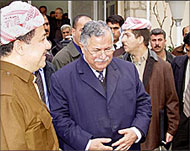Resolution exposes Shia, Kurd divisions
Iraq’s Arab Shia and Sunni Kurds are at loggerheads over the wording of a new UN Security Council resolution on the handover of power in Iraq.

Kurdish leaders Masud Barzani and Jalal Talabani issued a joint statement on Tuesday warning that Iraq’s interim constitution, or fundamental law, should be mentioned in the new UN resolution. They see this as vital for the cause of Kurdish self-rule.
In a statement to Aljazeera.net in Arbil, Masud Barzani, the leader of Kurdistan Democratic party (KDP), said he held those who want to put the Iraqi interim constitution on the shelf responsible for any future consequences.
“The abandonment of the Iraqi interim constitution is seen as gambling the destiny of Kurdish people, and this is a red line,” he said.
He stressed that the interim constitution is the only reason why Iraqi Kurds were convinced to stay within Iraq.
The war-weary country’s ethnic faultlines resurfaced as the world’s diplomats said they had all but clinched a deal in New York on a new Security Council resolution, giving the stamp of approval to a handover of authority in Iraq.
Conflicting demands
But Shia militias are up in arms over the fundamental law’s guarantee of Kurdish semi-autonomy in the northern provinces of Duhuk, Arbil and Sulaymaniya.
The country’s most influential Shia leader, Grand Ayat Allah Ali al-Sistani, who is based in Najaf, cautioned the UN against any reference to the charter in its resolution, threatening dire complications if it did.
Any mention of the interim constitution “is illegal and is rejected by a majority of Iraqis”, Sistani’s office said in a statement.
 |
|
The occupation of Iraq eased |
“Any attempt to give it legitimacy by mentioning it in the resolution … could have dangerous consequences,” the statement read, which was dated 6 June and was handed out in the southern Muslim holy city of Najaf on Monday.
When the interim law was adopted on 8 March, Sistani and Shia politicians voiced anger, allegedly over the fact Islam was not the sole basis of the charter and that Kurds were granted an implicit veto over a permanent constitution to be drafted next year.
The law gave the veto to any three Iraqi governorates which agree to object to any piece of legislation. Kurds form the majority in three governorates.
Protests
Around 2000 Shia Arabs marched through the streets of Baghdad on Tuesday heeding Sistani’s latest call.
They headed from the northern district of Al-Shaab toward the US-led occupation headquarters, waving Sistani posters.
The crowd denounced the interim constitution as an instrument of the United States, drafted behind closed doors with the aid of the US-picked, and now dissolved, Iraqi Governing Council.
“No, no to the provisional constitution. Yes, Yes to Ali. The governing council and the occupation forces have no right to write the Iraqi provisional constitution,” they shouted.
Hard-earned privileges
The Kurds, estimated to make up anywhere from 15% to 20% of Iraq’s population, are determined to keep their hard-earned privileges; they have fought for more than 50 years to win them.
“We want the fundamental law to be mentioned in the UN Security Council resolution,” Talabani and Barzani said in the statement published in the Kurdistan Democratic party’s Al-Taakhi newspaper.
|
“The abandonment Masud Barzani, leader, KDP |
“We want to be sure that it will be the basis of government before and after elections” scheduled for January.
The government picked early next year will rule until a permanent constitution is drafted and approved at the end of 2005.
“We want to obtain assurances in this interim period so that we can participate actively in the transitional government,” the statement read.
“In case the law is not applied or is suppressed, there will not be any choice for the Kurdistan government but to stop participating in the central government and its institutions, to boycott elections and forbid members of the central government from entering Kurdistan,” it added.
The leaders made clear they would never relinquish the self-rule they won in the north after the 1991 Gulf war.
“The people of Kurdistan will not be treated as second-class citizens after Saddam,” the two leaders wrote.
The Kurds were also annoyed with the occupation authorities.
“We hope the new Iraq will be different from that of the past concerning the rights of the Kurdish people. But after the liberation of the country, we feel that the US authorities are against the Kurds for inexplicable reasons.”
Both Barzani and Talabani had wanted the presidency or role of premier in the new caretaker government, but had been blocked by US overseer Paul Bremer, some former governing council members said.